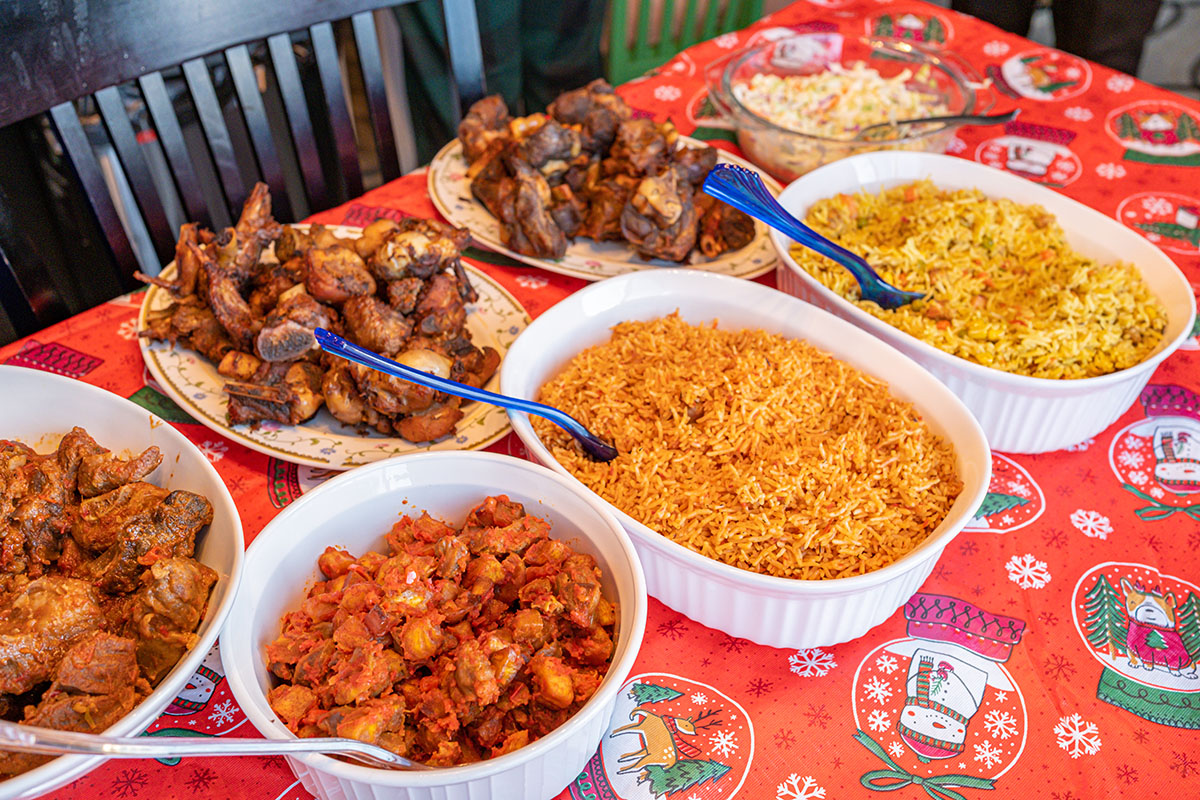Festive Cheer: Christmas in Nigeria
December 24by Adedoyin Ajayi
Nigerians love festivities, and Christmas celebration is no different. When the harmattan wind blows across Nigeria from the Sahara, it comes bearing dust, and a chill. Additionally, lingering on the air is the unmistakable whiff of Christmas. The harmattan winds dry everything in their path. However, it is powerless to dampen the obvious trace of Christmas in the air.
Nigerians love festivities, and Christmas is no different. In the days leading up to Christmas, families drape their windows and living rooms with twinkling lights, Christmas trees, and golden balls. Companies also get in on the festive cheer by adorning their mastheads with tinsel and decorating their hallways with colourful, hanging ornaments. Christmas trees of various sizes – ranging from a few feet high to towering edifices bedecked with glitter, twinkling red, blue, yellow, and green lights beautify the parking lots of grocery stores, shopping malls, and banks. Churches and schools are not left out of the season either. Similar beautifications are seen in both places, all in a bid to set the mood for the season.
Christmas comes with increased shopping activity by Nigerians. Tourist attractions, restaurants, and relaxation spots offer discounts on products for the teeming fun-seekers looking to unwind and let off some steam at the end of the year. Parents often buy “Christmas clothes” for their children, and families and friends go in groups to public places of relaxation like beaches, lounges, and restaurants. Long queues are common in large stores like Shoprite, as people plan to shop and stock their refrigerators ahead of the festive rush. Some also shop as a means to get in the groove and gift themselves or loved ones with Christmas souvenirs.
Nigerians also see the festive period as an opportunity to reconnect with old friends, get reacquainted with distant family members and strengthen the bonds of friendship and family. Friends meet up for get-togethers, co-workers plan hangouts, reunions among old classmates are commonplace, and family members visit their hometowns. This offers them the chance to get away from the hustle and bustle of city life, and to visit aged relatives. It also accords children the opportunity to better familiarize themselves with their extended family and deepen the knowledge of their roots. Churches, schools, and also companies organise carol services. They are bright, joyous occasions, where everyone collectively sings popular Christmas songs with delight.
As any Nigerian would tell you, no celebration or festivity is complete without “item 7,” a popular slang for food and drink. Christmas jollof rice is a particular favourite of Nigerians in the festive period. Families cook jollof rice, fried rice, and serve it with a side dish of vegetable salad. Usually, chicken or turkey is served at Christmas. However, goat meat, mutton, and beef are also served. Additionally, locally made dishes such as pounded yam and vegetable soup are prepared during Christmas. Drinks flow like streams. It is customary to entertain visitors and pile their plates high with food. Visits to families and friends, more often than most, usually results in coming away with a full belly.
Presenting and exchanging gifts is also a common Christmas activity in Nigeria. Companies gift their employees with rice, vegetable oil, and chicken or turkey (this is due to rice and chicken being the most consumed foods during the festive period). Furthermore, organisations give company-themed gift cards both to employees and to major customers as a means of appreciation for the year’s efforts and patronage respectively. Co-workers engage in “secret Santa,” a practice of exchanging gifts under the cloak of anonymity. This heartwarming act fosters collective unity and camaraderie in workplaces. It is also customary to accompany family visits to hometowns with gifts.
However, the unfavourable economic situation in Nigeria threatens to put a dampener on this year’s celebrations. With a skyrocketing inflation figure, the prices of food items have soared to astronomical levels nearly overnight. Nevertheless, neither the combination of the grim economic situation nor the hazy, dusty harmattan wind can extinguish the festive cheer brimming in the hearts of Nigerians.
Christmas is here, and I’m getting in the groove, just like everyone else!






